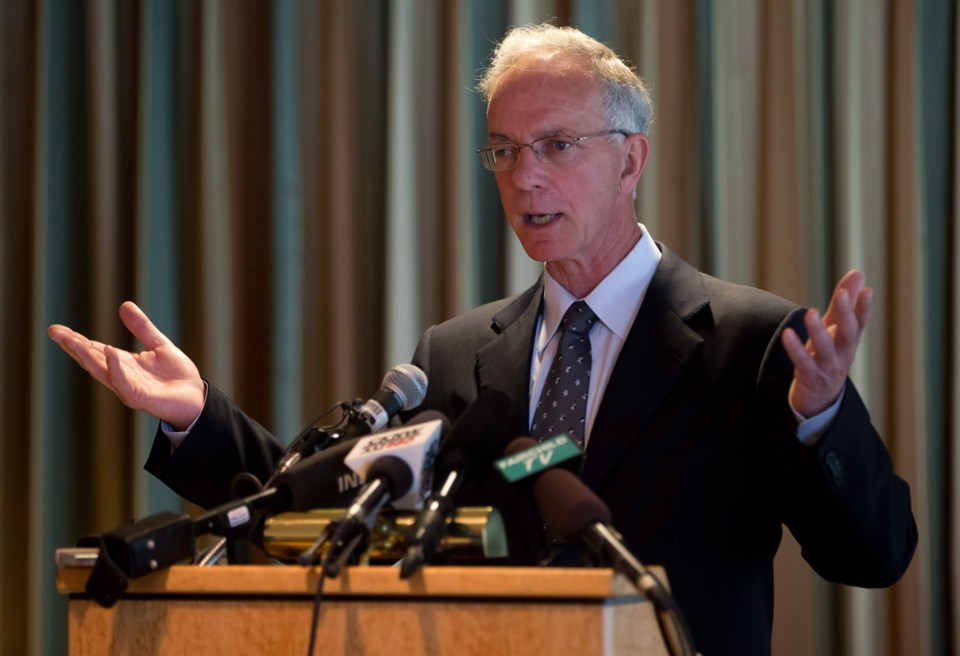 David Black is taking John Horgan and Jason Kenney at their word. The two premiers say they want to work together to close the chasm dividing Alberta and B.C.? Super. The Victoria businessman says he has just the idea, one that will benefit the economies of both provinces while helping ease global warming.
David Black is taking John Horgan and Jason Kenney at their word. The two premiers say they want to work together to close the chasm dividing Alberta and B.C.? Super. The Victoria businessman says he has just the idea, one that will benefit the economies of both provinces while helping ease global warming.
It’s called Kitimat Clean, the $22-billion north coast refinery he has been trying to get built for years.
One big problem: Black doesn’t say it, but there’s not enough room for both Kitimat Clean and the contentious Trans Mountain Pipeline expansion project — and Justin Trudeau is all in on the pipeline, so committed that he bought it with $4.5 billion of our money. Also, Kenney just got himself elected by promising to horsewhip every British Columbian who gets in the pipeline’s way (well, no, but you get the point). Good luck getting them off that track.
Here’s Black’s pitch:
He wants to build a refinery 13 kilometres north of Kitimat, one that he says would be the greenest in the world. Refining Alberta bitumen there would be far cleaner than shipping it to more harmful refineries abroad. “We will develop a very clean plant the rest of the world can copy as they continue to build refineries. If we ignore this opportunity, we deliberately worsen global warming.”
That logic might not wash with those who would rather the oil not be refined at all, who argue it would be better to stop burning fossil fuels altogether, but Black argues that transition can’t be made as fast as people want.
“Since we will not be able to move quickly away from fossil fuels, to reduce global warming we must reduce emissions while the fuels are still in use.”
His plan would not involve a pipeline from Alberta (which is good, because the feds already vetoed the proposed Northern Gateway across northern B.C.) Rather, his vision includes turning diluted bitumen into pellets at a plant in Alberta, then shipping the pellets by train to the refinery on the coast. (Why the coast? Because to be economical, refinery components would have to be built in a high-tech, low-wage Asian country, then shipped to this side of the Pacific for assembly.)
His plan would also address B.C.’s major argument against the Trans Mountain expansion, the potential for an Exxon Valdez-type crack-up on the West Coast.
The idea is that any spill of refined products — gasoline, diesel, jet fuel — would be much less damaging than one of tar-like dilbit.
The economics make sense, Black argues: “Transport savings for oil producers will amount to $10 to $15 per barrel when compared to shipments to the current markets of Houston and Los Angeles. The province of Alberta alone will earn up to an extra $1 billion per year if it has 200,000 barrels of its own royalty bitumen to send to Kitimat every day.
“Shipping 400,000 barrels of pure bitumen per day by train is equivalent to shipping 560,000 barrels per day of diluted bitumen by pipeline, but it saves the large cost of buying and moving the diluent. And it saves the capital cost of building the pipeline.
“Also Edmonton is far closer to Kitimat than it is to its current dilbit markets, and Kitimat is far closer to future overseas Asian markets than Houston is, so movement costs will be much lower.”
Black has had enough meetings with First Nations and other northern residents to convince him they would be on side. “A top Canadian bank has said that it will be able to raise all the required funding.” He figures two years for the approval process, then six years for construction. Easy- peasey, right?
Maybe not. Maybe foreign markets just want our dilbit, not our refined products. Maybe investors don’t want to risk long-term capital in an industry with an uncertain future. Maybe, maybe, maybe. All we know for sure is that, so far, the big players in Ottawa and Calgary have embraced Black’s plan with all the enthusiasm of Horgan and Kenney hugging it out at the First Ministers’ Barbecue.
But here’s the deal: amid all the warring and snarling over the pipelines, Black is proposing a solution. He has been doing so for years, without a well-articulated response from government and industry. If they have a detailed explanation of why Kitimat Clean won’t work, let’s hear it.



